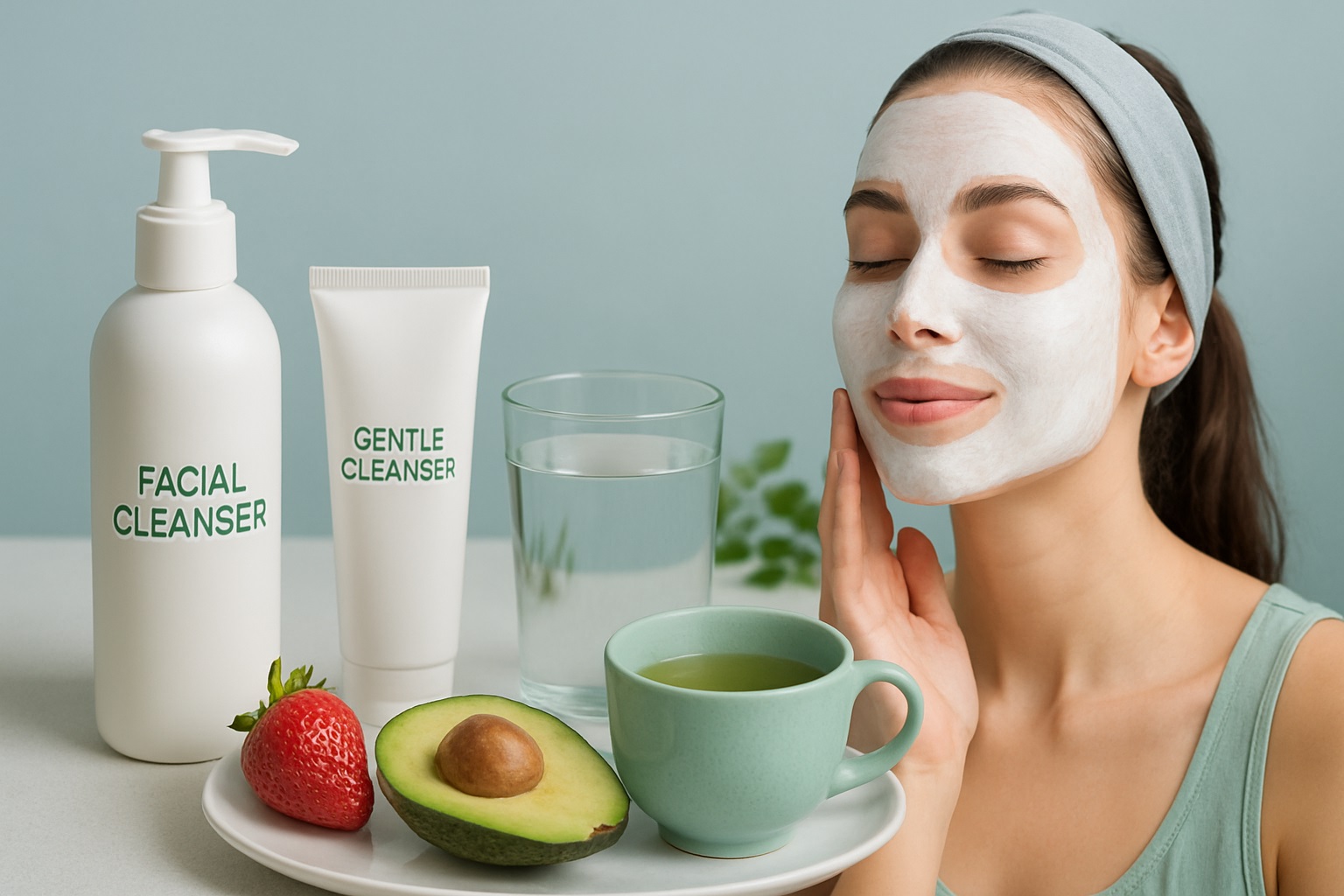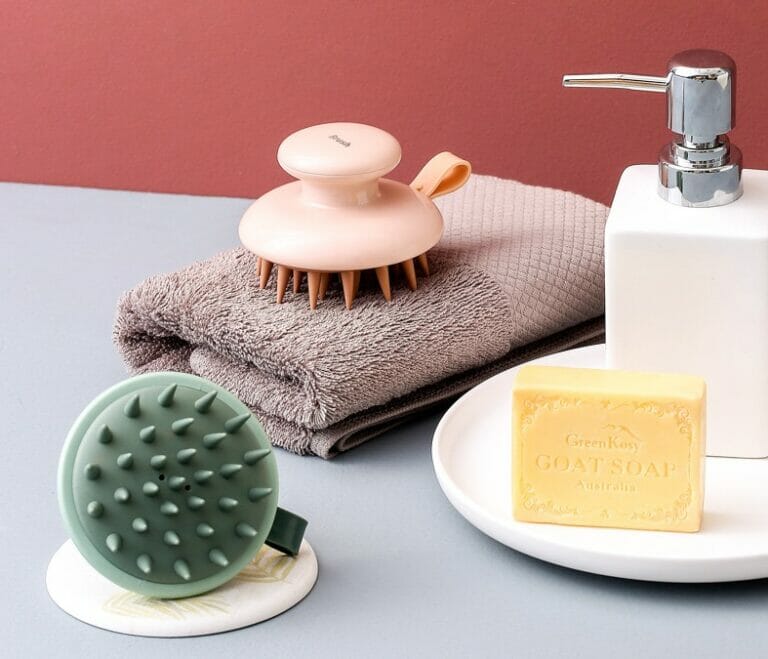Simple Ways to Prevent Acne Flare-Ups Before Your Period

Feeling upset by pimples before your period? You are not the only one. Many women get pimples right before their period starts.
Studies say up to 85% of women see their skin get worse before their period.
More than 44% have breakouts every month.
Last month, I ate cherries every day before my period, and to my surprise, my acne disappeared this time. You can help acne go away with easy changes and some hope.
Key Takeaways
Use spot treatments with benzoyl peroxide or salicylic acid. These can help make pimples go away faster before your period. Wash your face two times each day with a gentle cleanser. Make sure the cleanser does not clog pores. This helps stop breakouts. Eat foods with antioxidants like cherries and berries. These foods help your skin heal and stay clear.
Quick Ways to Make Acne Disappear
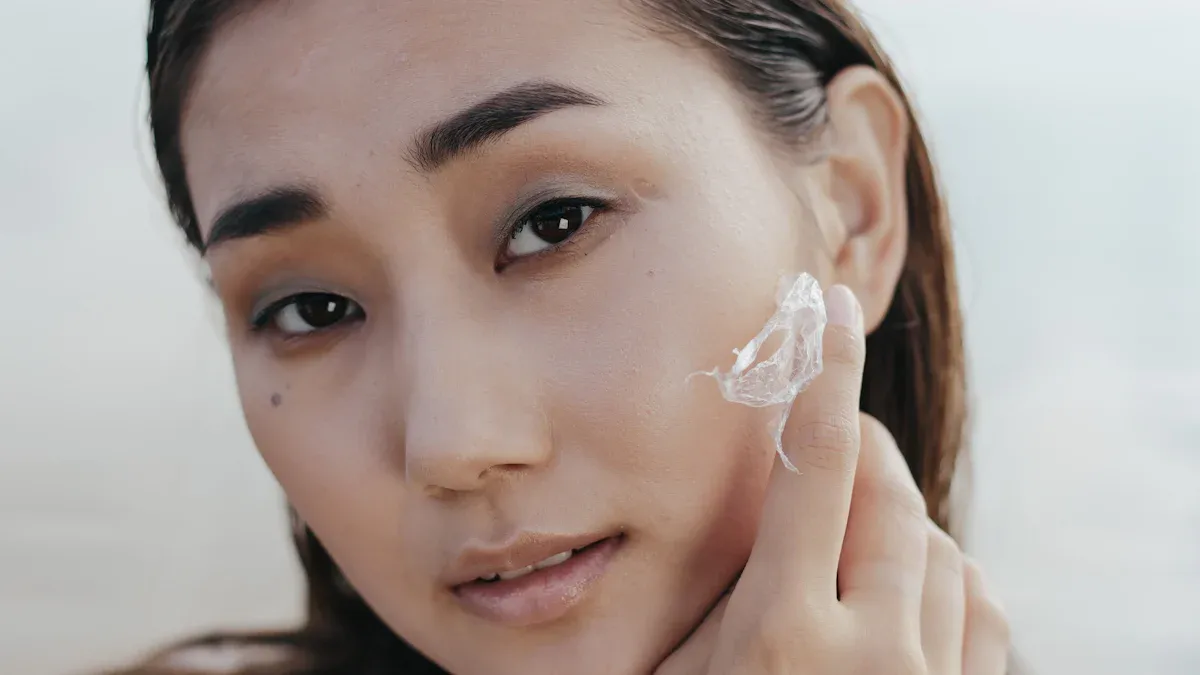
Fast-Acting Tips
You want acne gone before your period, right? Try these simple steps that work fast:
Spot Treatments: Dab a small amount of benzoyl peroxide or salicylic acid gel on pimples. These ingredients help shrink spots quickly.
Warm Compresses: Place a warm, damp cloth on painful pimples for a few minutes. This can ease swelling and help draw out pus.
Cold Compresses: Use a cold pack to calm redness and reduce pain.
Gentle Cleansing: Wash your face twice a day with a mild, oil-free cleanser. This keeps pores clear without irritating your skin.
Avoid Scrubbing: Skip harsh scrubs. They can make acne worse by causing more inflammation.
Quick Medications: Some doctors use special medicines like rofecoxib or corticosteroids for tough cases. These are usually for severe breakouts and need a prescription.
Tip: If you feel a pimple coming, start your spot treatment right away. Early action helps acne disappear faster.
Why These Work
You might wonder why these tricks help your skin look better so quickly. Here’s the science behind each step:
Spot Treatments: Benzoyl peroxide and salicylic acid fight bacteria and clear blocked pores. They speed up healing and make acne disappear faster.
Warm Compresses: Heat boosts blood flow and helps your body fight inflammation. It also softens the skin, making it easier for pus to come out.
Cold Compresses: Cold shrinks blood vessels and calms swelling. You feel less pain, and your skin looks less red.
Gentle Cleansing: Washing your face removes oil and dead skin cells. Studies show that cleaning twice a day with a mild cleanser leads to fewer pimples. If you wash only once, acne can get worse.
Avoid Scrubbing: Scrubbing damages your skin’s barrier. This causes more redness and can make pimples last longer.
Quick Medications: Medicines like rofecoxib and corticosteroids lower inflammation. Doctors sometimes use them for severe premenstrual acne. They work best when started before your period.
Remember, gentle care and quick action help acne disappear before your period. You don’t need fancy products—just smart habits and a little patience.
Hormones and Period Acne
What Happens to Your Skin
You might notice your skin starts acting up right before your period. This is not your imagination. Your hormones shift during your cycle, and your skin reacts. Here’s what goes on:
After you ovulate, estrogen drops and progesterone rises. Testosterone also goes up.
Your body starts making more sebum, which is an oily substance. Sebum can clog your pores.
Without enough estrogen, your skin loses its natural ability to fight excess oil.
Androgens, like testosterone, push your skin to produce even more oil.
All these changes make your skin feel oilier and more congested. You may see pimples pop up on your face, back, or even behind your ears.
Why Flare-Ups Occur
You’re not alone if you get more breakouts before your period. In fact, about 63% of women notice more acne during the late luteal phase. Around 65% say their acne gets worse with their period.
Here’s why flare-ups happen:
Estrogen helps keep your skin clear by lowering oil production.
Progesterone does the opposite. It increases oil, which can block pores and cause pimples.
When estrogen is low and progesterone is high, your skin gets oily fast.
Hormonal imbalance makes it easier for acne to appear.
If you want to see your acne disappear before your period, understanding these hormone changes is the first step. Once you know what’s happening, you can take action to help your skin stay clear.
Skincare Routine Tips
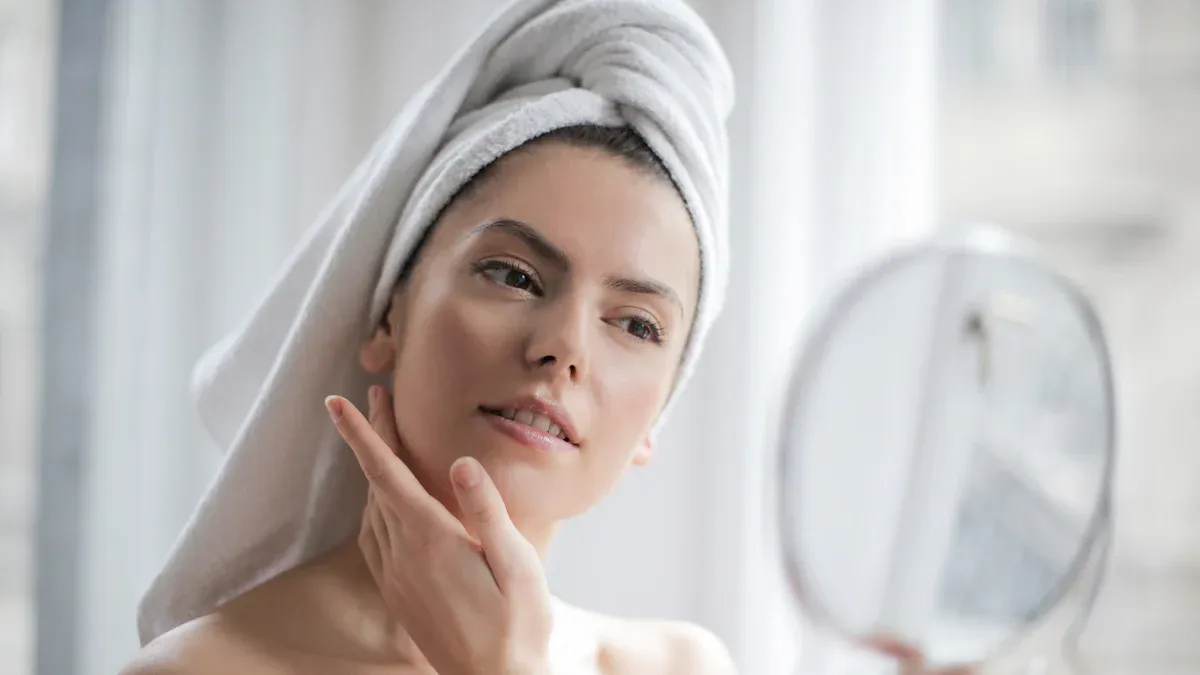
Gentle Cleansing
You want your skin to feel clean and calm before your period. Washing gently helps keep acne from getting worse. Pick a cleanser that is soft and will not block your pores. Check this table to see what makes a good cleanser:
Description | |
|---|---|
Non-comedogenic | Does not clog pores |
Non-acnegenic | Does not cause acne |
Non-irritating | Gentle on the skin |
Non-allergenic | Safe for sensitive skin |
Importance of gentle cleansing | Stops acne from getting worse and keeps skin healthy |
Wash your face two times each day. Use warm water and dry your face with a clean towel. Doing this can help your skin stay clear.
Non-Comedogenic Products
You may see more pimples before your period. Non-comedogenic products can help you with this problem. Here’s why they are good:
Non-comedogenic products do not block your pores.
Hormones before your period make your skin oily and can block pores.
Using these products every day helps stop breakouts during your cycle.
Look for “non-comedogenic” on your makeup, sunscreen, and moisturizer. Your skin will be happy!
Salicylic Acid and Benzoyl Peroxide
Salicylic acid and benzoyl peroxide are both used to fight acne. They work in different ways. Look at this table:
Ingredient | Efficacy in Reducing Acne Lesions | Notes |
|---|---|---|
Salicylic Acid | B | Helps remove dead skin and open pores, but does not work for everyone. |
Benzoyl Peroxide | A+ | Kills bacteria and lowers swelling, works best for most people. |
A study showed benzoyl peroxide works better for most people, but salicylic acid helps too. You can use one or both, but start slow so your skin does not get too dry.
Avoid Picking and Over-Exfoliating
It is hard not to touch pimples, but picking makes things worse. Here is what happens if you pick or scrub too much:
You might get dark spots or scars.
Scrubbing too much makes your skin red and sore.
Tip: Let your skin heal by itself. Being gentle helps acne go away faster and keeps your skin looking good.
Pay Attention to Health Check Figure Related to Kidneys
Growing pimples / acne may imply your kidney may not function very well. If you have annual health check, please pay attention to the result on this “eGFR(CKD-EPI)” value which reflects your kidney health. The higher this “eGFR(CKD-EPI)” value, the healthier is your kidney, and less likely that pimple / acne will be on your face. One example is shown in the screenshot below:

The eGFR(CKD-EPI) value on your report measures your estimated Glomerular Filtration Rate calculated using the Chronic Kidney Disease Epidemiology Collaboration equation.
What it means:
eGFR measures how well your kidneys are filtering your blood
It estimates the amount of blood your kidneys can filter per minute
The value is standardized to a body surface area of 1.73 m²
Your result (>90 ml/min/1.73 m²):
Your result is good news. An eGFR greater than 90 indicates normal kidney function. The reference range (>90) confirms this is within the expected healthy range.
eGFR interpretation scale:
>90: Normal kidney function
60-89: Mildly reduced kidney function
45-59: Mild to moderate kidney damage
30-44: Moderate to severe kidney damage
15-29: Severe kidney damage
<15: Kidney failure (may require dialysis)
Your value being above 90 means your kidneys are efficiently filtering waste products from your blood, which is exactly what you want to see on a kidney function test.
The other kidney markers on your report (urea and creatinine) also appear to be within normal ranges, further confirming healthy kidney function.
Diet to Help Acne Disappear
Eat More Cherries and Berries
Have you ever tried changing your diet before your period? I did, and it made a huge difference. Last month, I started eating cherries every day the week before my period. My mom had bought a big bag, so I just grabbed a handful each morning. Guess what? My skin stayed clear. No pimples showed up, even on the day my period started. It felt like a miracle!
Cherries and berries do more than taste good. They are packed with antioxidants like vitamin C and anthocyanin. These nutrients help your skin heal, boost collagen, and lower inflammation. If you want your skin to look smooth and healthy, add blueberries, cranberries, and cherries to your snacks.
Tip: Antioxidant-rich foods can help your skin fight off redness and swelling. Try a bowl of berries for breakfast or a cherry smoothie after school.
Low Sugar and Dairy
Some foods can make your skin worse before your period. You might notice more breakouts if you eat lots of sugar or dairy. Here’s why:
High sugar diets can mess with your hormones and cause more acne.
Dairy products, like milk and cheese, may raise hormone levels and trigger pimples.
Milk contains proteins that can lead to more oil and breakouts.
Eating lots of sugary foods can make your skin inflamed and oily.
If you want to see acne disappear, try cutting back on sweets and dairy. Choose low glycemic foods like whole grains, veggies, and lean meats.
Stay Hydrated
Water is your skin’s best friend. When you drink enough, your skin stays soft and less oily. If you don’t drink enough, your skin can get dry and break out more before your period.
Low hydration makes acne worse.
Hormones can change how much water your skin holds.
Drinking water helps your skin stay balanced and clear.
Keep a water bottle with you and sip throughout the day. Your skin will thank you!
Healthy Habits for Clear Skin
Sleep and Stress Management
You might notice your skin gets worse when you feel tired or stressed. Sleep and stress play a big role in acne before your period. If you sleep well, your skin can heal and stay clear. Poor sleep can make acne worse, but the link is not super strong. Take a look at this table:
Variable | Correlation Coefficient (r) | p-value |
|---|---|---|
PSQI vs. Subjective Acne Severity | 0.19 | 0.23 |
PSQI vs. Objective Acne Severity (GAGS) | -0.15 | 0.36 |
Stress can also mess with your hormones. When you feel stressed, your body makes more cortisol. This hormone can cause your skin to produce extra oil, which leads to pimples. Try simple things like deep breathing, meditation, or yoga. These help your body relax and keep your skin calm.
Tip: Getting enough sleep and finding ways to relax can help your skin look better before your period.
Keep Hands and Phone Clean
Your hands and phone touch your face all day. They can carry bacteria and oils that cause breakouts. Did you know about 68% of smartphones have harmful bacteria? When you press your phone to your cheek, heat and friction can irritate your skin. Oils and sweat from your face can also clog pores.
Evidence | Description |
|---|---|
Bacterial Proliferation | Light from phones may help bacteria grow, which can cause acne. |
Heat and Friction | Phones get warm and rub against your skin, making irritation worse. |
Cleaning Recommendations | Wipe your phone often to keep it clean. |
Clean your phone and case regularly.
Use hands-free options when you can.
Wash your hands before touching your face.
Maintain a Healthy Weight
Keeping a healthy weight helps your skin stay clear. Studies show people with a healthy body weight have fewer problems with PMS and acne. Here’s a chart that shows how healthy habits lower the risk of PMS and acne:
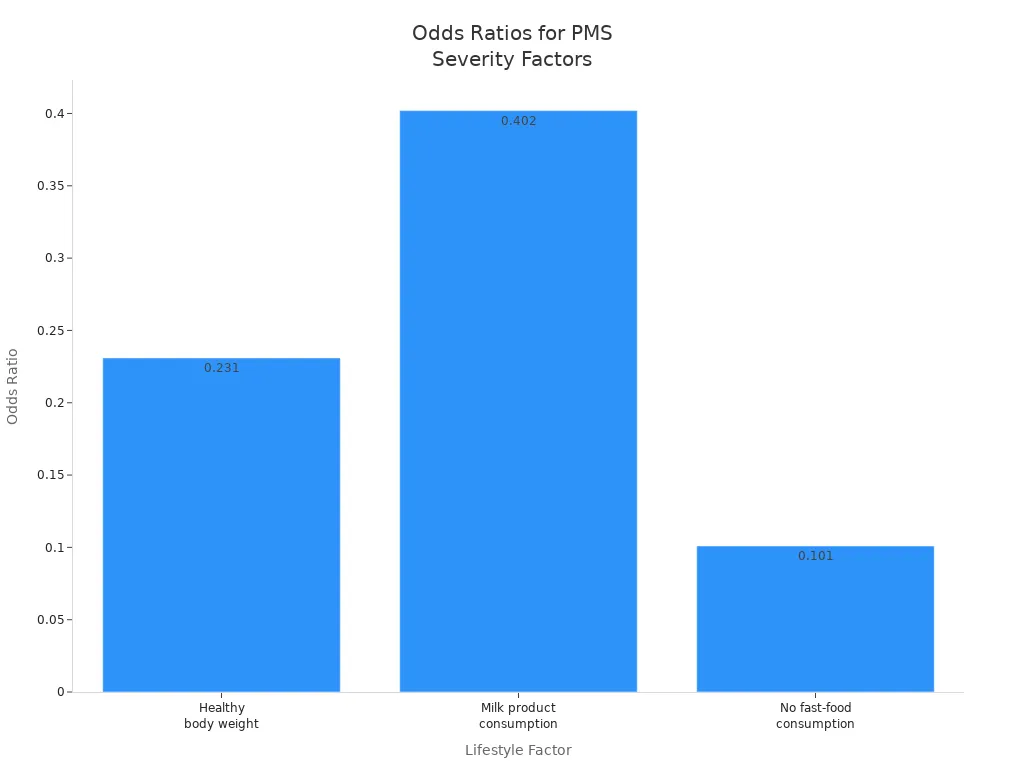
Eating more fruits and less fast food also helps. When you take care of your body, your skin will thank you.
Targeted Treatments
Spot Treatments and Compresses
You want fast relief when a pimple pops up before your period. Spot treatments and compresses can help you shrink those breakouts quickly. Here’s a handy table to show you some of the best over-the-counter ingredients and what they do:
Ingredient | Benefits |
|---|---|
Salicylic Acid | Exfoliates skin, unclogs pores, reduces inflammation. Great for small, surface pimples. |
Benzoyl Peroxide | Kills acne-causing bacteria and calms swelling. Works well for single, red spots. |
Niacinamide | Lowers redness, controls oil, and makes pores look smaller. Good for oily skin. |
Retinol | Speeds up skin renewal and fades dark marks. |
Azelaic Acid | Fights bacteria, soothes skin, and helps prevent clogged pores. |
You can dab these treatments right on the pimple. For sore or swollen spots, try a warm compress for a few minutes. This helps your skin feel better and may speed up healing.
Natural Remedies
If you like gentle, plant-based options, you have some choices that science supports. Here are a few natural remedies you can try:
Chasteberry may help balance hormones before your period.
Aloe vera soothes skin and fights bacteria.
Berberine can lower certain hormones linked to acne.
Tea tree oil has natural germ-fighting power.
Green tea can help control oil and calm your skin.
Tip: Always test a small area first to make sure your skin likes these remedies.
When to Use Retinoids or Centella Asiatica
Sometimes, you need a little extra help. You might want to try retinoids if you have severe hormonal acne that just won’t go away. These products help your skin renew itself faster.
Centella Asiatica works well if you want to calm your skin after a breakout. It soothes redness and helps your skin heal, especially if you worry about scars.
If your acne feels stubborn or leaves marks, these ingredients can give your skin the boost it needs.
When to See a Doctor
Signs You Need Help
Sometimes, acne just won’t go away, no matter what you try. You might wonder if it’s time to get help from a doctor. Here are some signs you should look out for:
Your acne feels cystic and painful.
You notice breakouts on your face, back, chest, or other parts of your body.
You see scars forming where pimples used to be.
Acne makes you feel self-conscious, anxious, or keeps you from hanging out with friends.
You’ve changed your diet, skincare, and stress habits, but nothing seems to help.
Your skin reacts badly to store-bought treatments and gets irritated.
Tip: If you spot any of these signs, don’t wait. A dermatologist can help you find answers and relief.
What a Dermatologist Can Do
You might feel nervous about seeing a skin doctor, but they have lots of ways to help you. Take a look at some treatments they offer:
Treatment Type | Description |
|---|---|
Antibiotic + topical medicine | Reduces redness and swelling; fights bacteria and unclogs pores. |
Isotretinoin | Targets all causes of acne; most people see clear skin after one course. |
Birth control pill | Balances hormones; works well with antibiotics or spironolactone for women. |
Spironolactone | Lowers oil production; helps with severe acne in women. |
Acne removal techniques | Includes injections, drainage, and extraction for large cysts. |
Low-dose prednisone | Used for very severe acne; strong anti-inflammatory effect. |
Topical creams | Prescription creams with retinoids, salicylic acid, or benzoyl peroxide. |
Oral medications | May include antibiotics or hormone treatments. |
Cortisone injections | Quickly calms deep, painful pimples and cysts. |
You don’t have to struggle alone. A dermatologist can help you get clearer skin and feel more confident.
You can make acne better before your period by taking vitamin B6. Eat less dairy to help your skin. Use gentle skincare with salicylic acid. Cherries and berries taste good and help your skin. Stay active and try to sleep well every night. Be patient because clear skin takes time. If you still get breakouts, talk to a doctor.
FAQ
What should you do if you get a big pimple right before your period?
Try a spot treatment with benzoyl peroxide. Use a warm compress for a few minutes. Don’t pick at it. Your skin will heal faster.
Can eating cherries really help prevent period acne?
Yes! Many people notice fewer breakouts when they eat cherries or berries before their period. These fruits have antioxidants that support healthy skin.
How soon should you start your acne routine before your period?
Start your routine about one week before your period. This helps your skin adjust and lowers the chance of breakouts.

